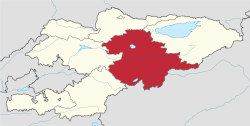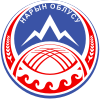Naryn Region: Difference between revisions
m Missing space after ref tag., replaced: /ref>T → /ref> T |
No edit summary |
||
| Line 54: | Line 54: | ||
| official_name = |
| official_name = |
||
}} |
}} |
||
'''Naryn Region''' ({{lang-ky|'''Нарын облусу'''}}, '' |
'''Naryn Region''' ({{lang-ky|'''Нарын облусу'''}}, ''Naryn oblusu'', نارىن وبلاستى) is the largest region (''[[oblast]]'') of [[Kyrgyzstan]]. It is located in the east of the country and borders with [[Chuy Region]] in the north, [[Issyk Kul Region]] in the northeast, [[Xinjiang|Xinjiang Uyghur Autonomous Region]] of [[China]] in the southeast, [[Osh Region]] in the southwest, and [[Jalal-Abad Region]] in the west. Its capital is [[Naryn]]. The region was established on 21 November 1939 as Tien-Shan Region. On 20 December 1962 the region was dissolved, but on 11 December 1970 re-established again. On 5 October 1988 it was unified with [[Issyk-Kul Region]], and, finally, on 14 December 1990 it got back its present name: Naryn Region.<ref>[http://www.welcome.kg/ru/kyrgyzstan/region/sswjk/ Brief Description of Naryn Region (in Russian)]</ref> |
||
The main highway runs from the Chinese border at [[Torugart Pass]] north to [[Balykchy]] on [[Issyk Kul Lake]]. It is known as the location of [[Song Kol Lake]] and [[Chatyr-Kul Lake]] and [[Tash Rabat]]. |
The main highway runs from the Chinese border at [[Torugart Pass]] north to [[Balykchy]] on [[Issyk Kul Lake]]. It is known as the location of [[Song Kol Lake]] and [[Chatyr-Kul Lake]] and [[Tash Rabat]]. |
||
Revision as of 12:12, 10 October 2021
Naryn Region
Нарын облусу Нарынская область | |
|---|---|
Region | |
 A mosque in Naryn | |
 Map of Kyrgyzstan, location of Naryn Region highlighted | |
| Coordinates: 41°30′N 75°30′E / 41.500°N 75.500°E | |
| Country | |
| Capital | Naryn |
| Government | |
| • Gubernator | Omurbek Suvanaliev |
| Area | |
• Total | 45,200 km2 (17,500 sq mi) |
| Population (2020-01-01)[1] | |
• Total | 289,621 |
| • Density | 6.4/km2 (17/sq mi) |
| Time zone | UTC+6 (East) |
| • Summer (DST) | UTC+6 (not observed) |
| ISO 3166 code | KG-N |
| Districts | 5 |
| Cities | 1 |
| Townships | 2 |
| Villages | 134 |
Naryn Region (Template:Lang-ky, Naryn oblusu, نارىن وبلاستى) is the largest region (oblast) of Kyrgyzstan. It is located in the east of the country and borders with Chuy Region in the north, Issyk Kul Region in the northeast, Xinjiang Uyghur Autonomous Region of China in the southeast, Osh Region in the southwest, and Jalal-Abad Region in the west. Its capital is Naryn. The region was established on 21 November 1939 as Tien-Shan Region. On 20 December 1962 the region was dissolved, but on 11 December 1970 re-established again. On 5 October 1988 it was unified with Issyk-Kul Region, and, finally, on 14 December 1990 it got back its present name: Naryn Region.[2]
The main highway runs from the Chinese border at Torugart Pass north to Balykchy on Issyk Kul Lake. It is known as the location of Song Kol Lake and Chatyr-Kul Lake and Tash Rabat.
The population of Naryn oblast is 99% Kyrgyz. The economy is dominated by animal herding (sheep, horses, yaks), with wool and meat as the main products. Mining of various minerals developed during the Soviet era has largely been abandoned as uneconomical.[3] Today the oblast is considered to be the poorest region in the country, but also the most typically Kyrgyz. It boasts beautiful mountains, alpine pastures and Son-Kul Lake which during summer months attracts large herds of sheep and horses with their herders and their yurts.
Demographics
As of 2009, Naryn Region contained 1 town (Naryn), 2 urban-type settlements, and 134 villages. Its population, according to the Population and Housing Census of 2009 amounted to 245.3 thousand (enumerated de facto population) or 257.8 thousand (de jure population).[4] The region's population estimate for the beginning of 2020 was 289,621.[1]
| Year | Pop. | ±% |
|---|---|---|
| 1970 | 176,844 | — |
| 1979 | 213,887 | +20.9% |
| 1989 | 249,416 | +16.6% |
| 1999 | 248,699 | −0.3% |
| 2009 | 245,266 | −1.4% |
| Note: de jure population; Source:[4] | ||
Ethnic composition
According to the 2009 Census, the ethnic composition of the Naryn Region (de jure population) was:[4]
| Ethnic group | Population | Proportion of Naryn Region population |
|---|---|---|
| Kyrgyzs | 255,799 | 99.2% |
| Uzbeks | 568 | 0.2% |
| Dungans | 429 | 0.2% |
| Uygurs | 339 | 0.1% |
| Kazakhs | 215 | 0.1% |
| Russians | 157 | 0.1% |
| other groups | 261 | 0.1% |
Basic socio-economic indicators
- Employed population: 89,300 (2008)[5]
- Registered Unemployed Population: 6,922 (2008)[6]
- Export: 0.9 million US dollars (2008)[7]
- Import: 4.0 million US dollars (2008)[7]
- Direct Foreign Investments: 1,1 million US dollars (in 2008)[8]
Districts
Naryn Region is divided administratively into 5 districts [9]


| District | Capital |
|---|---|
| Ak-Talaa District | Baetov |
| At-Bashy District | At-Bashy |
| Jumgal District | Chaek |
| Kochkor District | Kochkor |
| Naryn District | Naryn |
References
- ^ a b Population of regions,districts, towns, urban-type settlements, rural communities and villages of Kyrgyz Republic (National Statistical Committee estimate as of the beginning of 2020) Численность населения областей, районов, городов, поселков городского типа,айылных аймаков и сел Кыргызской Республики (оценка НСК на начало 2020г)
- ^ Brief Description of Naryn Region (in Russian)
- ^ Sternberg, Troy (2020). "Conflict and contestation in Kyrgyz mining infrastructure". The Extractive Industries and Society. 7 (4): 1392–1400. doi:10.1016/j.exis.2020.10.016.
- ^ a b c "2009 population census of the Kyrgyz Republic: Naryn Region" (PDF). Archived from the original (PDF) on 25 October 2012. Retrieved 15 June 2016.
- ^ National Committee on Statistics (in Kyrgyz/Russian) Archived 14 November 2010 at the Wayback Machine
- ^ National Committee on Statistics (in Kyrgyz/Russian) Archived 14 November 2010 at the Wayback Machine
- ^ a b National Committee on Statistics (in Kyrgyz/Russian) Archived 22 July 2011 at the Wayback Machine
- ^ National Committee on Statistics (in Kyrgyz/Russian) Archived 22 July 2011 at the Wayback Machine
- ^ Kyrgyzstan - Джалал-Абадская область
Works cited
- Laurnnce Mitchell, Kyrgyzstan, Bradt Travel Guides, 2008


